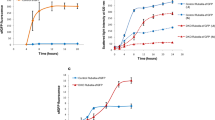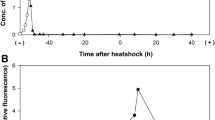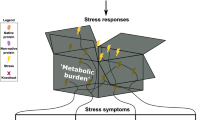Abstract
Recombinant Escherichia coli cultures are used to manufacture numerous therapeutic proteins and industrial enzymes, where many of these processes use elevated temperatures to induce recombinant protein production. The heat-shock response in wild-type E. coli has been well studied. In this study, the transcriptome profiles of recombinant E. coli subjected to a heat-shock and to a dual heat-shock recombinant protein induction were examined. Most classical heat-shock protein genes were identified as regulated in both conditions. The major transcriptome differences between the recombinant and reported wild-type cultures were heavily populated by hypothetical and putative genes, which indicates recombinant cultures utilize many unique genes to respond to a heat-shock. Comparison of the dual stressed culture data with literature recombinant protein induced culture data revealed numerous differences. The dual stressed response encompassed three major response patterns: induced-like, in-between, and greater than either individual stress response. Also, there were no genes that only responded to the dual stress. The most interesting difference between the dual stressed and induced cultures was the amino acid-tRNA gene levels. The amino acid-tRNA genes were elevated for the dual cultures compared to the induced cultures. Since, tRNAs facilitate protein synthesis via translation, this observed increase in amino acid-tRNA transcriptome levels, in concert with elevated heat-shock chaperones, might account for improved productivities often observed for thermo-inducible systems. Most importantly, the response of the recombinant cultures to a heat-shock was more profound than wild-type cultures, and further, the response to recombinant protein induction was not a simple additive response of the individual stresses.


Similar content being viewed by others
References
Baneyx F, Mujacic M (2004) Recombinant protein folding and misfolding in Escherichia coli. Nat Biotechnol 22:1399–1408
Blattner FR, Plunkett G, Bloch CA, Perna NT, Burland V, Riley M, ColladoVides J, Glasner JD, Rode CK, Mayhew GF, Gregor J, Davis NW, Kirkpatrick HA, Goeden MA, Rose DJ, Mau B, Shao Y (1997) The complete genome sequence of Escherichia coli K-12. Science 277:1453–1474
Bonomo J, Gill R (2005) Amino acid content of recombinant proteins influences the metabolic burden response. Biotechnol Bioeng 90:116–126
Chuang S-E, Blattner FR (1993) Characterization of twenty-six new heat shock genes of Escherichia coli. J Bacteriol 175:5242–5252
Chuang SE, Daniels DL, Blattner FR (1993) Global regulation of gene-expression in Escherichia coli. J Bacteriol 175:2026–2036
DeLisa MP, Li J, Rao G, Weigand WA, Bentley WE (1999) Monitoring GFP-operon fusion protein expression during high cell density cultivation of Escherichia coli using an on-line optical sensor. Biotechnol Bioeng 65:54–64
Gadgil M, Kapur V, Hu WS (2005) Transcriptional response of Escherichia coli to temprature shift. Biotechnol Prog 21:689–699
Gao HC, Wang Y, Liu XD, Yan TF, Wu LY, Alm E, Arkin A, Thompson DK, Zhou JZ (2004) Global transcriptome analysis of the heat shock response of shewanella oneidensis. J Bacteriol 186:7796–7803
Gerdes SY, Scholle MD, Campbell JW, Balazsi G, Ravasz E, Daugherty MD, Somera AL, Kyrpides NC, Anderson I, Gelfand MS, Bhattacharya A, Kapatral V, D’Souza M, Baev MV, Grechkin Y, Mseeh F, Fonstein MY, Overbeek R, Barabasi AL, Oltvai ZN, Osterman AL (2003) Experimental determination and system level analysis of essential genes in Escherichia coli MG1655. J Bacteriol 185:5673–5684
Gill RT, Delisa MP, Valdes JJ, Bentley WE (2001) Genomic analysis of high cell density recombinant Escherichia coli fermentation and “cell conditioning” for improved recombinant protein yield. Biotechnol Bioeng 72:85–95
Gill RT, Valdes JJ, Bentley WE (1999) Reverse transcription-PCR differential display analysis of Escherichia coli global gene regulation in response to heat shock. Appl Environ Microbiol 65:5386–5393
Glasner JD, Liss P, Plunkett G, Darling A, Prasad T, Rusch M, Byrnes A, Gilson M, Biehl B, Blattner FR, Perna NT (2003) ASAP, a systematic annotation package for community analysis of genomes. Nucleic Acids Res 31:147–151
Gross CA (1996) Function and regulation of the heat shock. In: Neidhardt FC, Curtiss R, Lin ECC, Low KB, Magasanik B, Reanikoff WS, Riley M, Schaechter M, Umbarger HE (eds) Escherichia coli and Salmonella. ASM Press, Washington DC, pp 1382–1399
Grossman AD, Taylor WE, Burton ZF, Burgess RR, Gross CA (1985) Stringent response in Escherichia coli induces expression of heat shock proteins. J Mol Biol 186:357–365
Haddadin FT, Harcum SW (2005) Transcriptome profiles for high-cell-density recombinant and wild-type Escherichia coli. Biotechnol Bioeng 90:127–153
Han MJ, Park SJ, Park TJ, Lee SY (2004) Roles and applications of small heat shock proteins in the production of recombinant proteins in Escherichia coli. Biotechnol Bioeng 88:426–436
Harcum SW, Bentley WE (1993) Response dynamics of 26-, 34-, 39-, 54-, and 80-kDa proteases in induced cultures of recombinant Escherichia coli. Biotechnol Bioeng 42:675–685
Harcum SW, Bentley WE (1999) Heat-shock and stringent responses have overlapping protease activity in Escherichia coli: Implications for heterologous protein yield. Appl Biochem Biotechnol 80:23–37
Henry MD, Yancey SD, Kushner SR (1992) Role of the heat shock response in stability of mRNA in Escherichia coli K-12. J Bacteriol 174:743–748
Herendeen SL, VanBogelen RA, Neidhardt FC (1979) Levels of major proteins of Escherichia coli during growth at different temperatures. J Bacteriol 139:185–194
Hoffmann F, Rinas U (2001) Plasmid amplification in Escherichia coli after temperature up shift is impaired by induction of recombinant protein synthesis. Biotechnol Lett 23:1819–1825
Hoffmann F, Weber J, Rinas U (2002) Metabolic adaptation of Escherichia coli during temperature-induced recombinant protein production: 1. Readjustment of metabolic enzyme synthesis. Biotechnol Bioeng 80:313–319
Kanemori M, Mori H, Yura T (1994) Induction of heat shock proteins by abnormal proteins results from stabilization and not increased synthesis of σ32 in Escherichia coli. J Bacteriol 176:5648–5653
Kucharczyk K, Laskowska E, Taylor A (1991) Response of Escherichia coli cell membranes to induction of l cl857 prophage by heat shock. Mol Microbiol 5:2935–2945
Lee SC, Olins PO (1992) Effect of overproduction of heat shock chaperones GroESL and DnaK on human procollagenase production in Escherichia coli. J Biol Chem 267:2849–2852
Lemaux PG, Herendeen SL, Bloch P, Neidhardt FC (1978) Transient rates of synthesis of individual polypeptides in E. coli following temperature shifts. Cell 13:427–434
Lesley SA, Graziano J, Cho CY, Knuth MW, Klock HE (2002) Gene expression response to misfolded protein as a screen for soluble recombinant protein. Protein Eng 15:153–160
Makrides SC (1996) Strategies for achieving high-level expression of genes in Escherichia coli. Microbiol Rev 60:512
Nagai H, Yuzawa H, Yura T (1991) Regulation of the heat shock response in E. coli: involvement of positive and negative cis-acting elements in translational control of σ32 synthesis. Biochimie 73:1473–1479
Pilon AL, Yost P, Chase TE, Lohnas GL, Bentley WE (1996) High-level expression and efficient recovery of ubiquitin fusion proteins from Escherichia coli. Biotechnol Prog 12:331–337
Richmond CS, Glasner JD, Mau R, Jin H, Blattner FJ (1999) Genome-wide expression profiling in Escherichia coli K-12. Nucleic Acids Res 27:3821–3835
Riley M, Abe T, Arnaud MB, Berlyn MKB, Blattner FR, Chaudhuri RR, Glasner JD, Horiuchi T, Keseler IM, Kosuge T, Mori H, Perna NT, Plunkett G, Rudd KE, Serres MH, Thomas GH, Thomson NR, Wishart D, Wanner BL (2006) Escherichia coli K-12: a cooperatively developed annotation snapshot - 2005. Nucleic Acids Res 34:1–9
Rodriguez RL, Tait RE (1983) Recombinant DNA techniques: an introduction. Benjamin/Cummings, Menlo Park, CA
Rohlin L, Oh MK, Liao JC (2002) DNA microarray for microbial biotechnology: gene expression profiles in Escherichia coli during protein overexpression. J Chin Inst Chem Eng 33:103–112
Schmidt M, Babu KR, Khanna N, Marten S, Rinas U (1999) Temperature-induced production of recombinant human insulin in high-cell density cultures of recombinant Escherichia coli. J Biotechnol 68:71–83
Schmidt M, Viaplana E, Hoffmann F, Marten S, Villaverde A, Rinas U (1999) Secretion-dependent proteolysis of heterologous protein by recombinant Escherichia coli is connected to an increased activity of the energy-generating dissimilatory pathway. Biotechnol Bioeng 66:61–67
Srivastava R, Peterson MS, Bentley WE (2001) Stochastic kinetic analysis of the Escherichia coli stress circuit using σ32-targeted antisense. Biotechnol Bioeng 75:120–129
Storz G, Regine H-A (2000) Bacterial stress response. ASM Press, Wachington, DC
Thomas JG, Baneyx F (1996) Influence of a global deregulation of the heat-shock response on the expression of heterologous proteins in Escherichia coli. Ann N Y Acad Sci 782:478–485
Thomas JG, Baneyx F (1996) Protein folding in the cytoplasm of Escherichia coli: requirements for the DnaK-DnaJ-GrpE and GroEL-GroES molecular chaperone machines. Mol Microbiol 21:1185–1196
Vlazny D, Hill C (1995) A stationary-phase-dependent viability block governed byt two different polypeptides from the rhsa genetic element of Escherichia coli K-12. J Bacteriol 177:2209–2213
Wegrzyn A, Wegrzyn G, Taylor K (1996) Disassembly of the coliphage l replication complex due to heat shock induction of the groE operon. Virology 217:594–597
Wild J, Walter WA, Gross CA, Altman E (1993) Accumulation of secretory protein precursors in Escherichia coli induces the heat shock response. J Bacteriol 175:3992–3997
Xu HM, Zhang GY, Ji XD, Cao L, Shu L, Hua ZC (2005) Expression of soluble, biologically active recombinant human endostatin in Escherichia coli. Protein Expres Purif 41:252–258
Yabuta M, Onaimiura S, Ohsuye K (1995) Thermo-inducible expression of a recombinant fusion protein by Escherichia coli lac repressor mutants. J Biotechnol 39:67–73
Yamamori T, Ito K, Nakamura Y, Yura T (1978) Transient regulation of protein synthesis in Escherichia coli upon shift-up of growth temperature. J Bacteriol 134:1133–1140
Acknowledgment
This material is based upon work supported by the National Science Foundation under Grant No. 0303782.
Author information
Authors and Affiliations
Corresponding author
Rights and permissions
About this article
Cite this article
Harcum, S.W., Haddadin, F.T. Global transcriptome response of recombinant Escherichia coli to heat-shock and dual heat-shock recombinant protein induction. J IND MICROBIOL BIOTECHNOL 33, 801–814 (2006). https://doi.org/10.1007/s10295-006-0122-3
Received:
Accepted:
Published:
Issue Date:
DOI: https://doi.org/10.1007/s10295-006-0122-3




